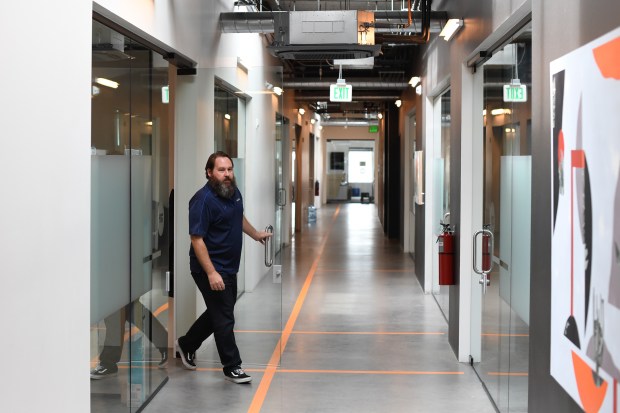It’s the big, potentially multi-million-dollar questions on the minds of commercial property owners, real estate brokers, interior designers, employers and countless office workers across the country.
What will the office of the future look like in the wake of the novel coronavirus pandemic? What do office users want and need in a space to feel safe and secure in signing a lease?
In Colorado, the offices of companies in “nonessential” fields are capped at 50% of capacity under the state’s “safer at home” guidelines. State health officials recommend allowing employees to work from home as much as possible. Some of the world’s largest companies like Facebook and Google are telling many of their employees to continue working from home into 2021 at least.
For Denver-area companies, essential and otherwise, that have moved into new spaces during the pandemic, some early answers to those big questions are starting to emerge. For some small firms, there is an increased focus on open spaces the give employees room, windows that open and let in fresh air and more privacy than prior arrangements — say at shared office or co-working spaces — may have afforded them. Outside of the makeup of the physical space, affordability and lease flexibility are paramount at a time when the country’s economic recovery appears to be sputtering and stalling.
“Certainly the opportunity to save money during this period was a factor,” Chris O’Halloran, CEO of Denver-based startup Joyne said Monday, the day his company was scheduled to move into a suite at the Flight office building in River North Art District. “We’re all trying to minimize our cost at the moment because there is a heightened level of unknown.”
But money was hardly the only consideration in Joyne’s move. The company, which provides contractors with an online platform for generating cost estimating, ordering materials and other pre-construction tasks, is growing. It closed on a $2.5 million seed funding round in April. Its Denver headquarters housed just O’Halloran and one other staffer when it opened in the Spaces co-working space near Coors Field but has since grown to four people. The company eventually absorbed a neighboring office inside the co-working space to use as a private conference room, growing Joyne’s footprint in the building to more than 700 square feet.
Its suite on the fourth floor of the Flight building is 600 square feet but feels and operates bigger than the two offices in Spaces, O’Halloran said. It came furnished with items including adjustable standing desks and already has a private conference room inside, a must for Joyne, which in addition to its team in Denver has employees in Sri Lanka, O’Halloran’s native Australia and elsewhere.
“It’s got windows. Every office is external,” O’Halloran said, adding that he looked into another co-working space before signing on at Flight but the only room available in that space was in the middle of the building with no access to an external wall. “Certainly, it feels like a bigger space. Whether that’s just the shape of the room or what. It’s a bigger space for a third less money.”
RJ Sangosti, The Denver Post
Chris O’Halloran, CEO and founder of Joyne, recently moved his company’s new 600-square-foot space at the Flight building in the Zeppelin Development on July 28, 2020 in Denver.
Flight, part of Zeppelin Development’s mixed-use Taxi project along the South Platte River, has 35 suites like the one Joyne just moved into. Leasing discussions have been steady late despite the pandemic, according to Adam Larkey, Zeppelin’s director of sales and leasing.
“We are seeing a lot (of prospective tenants) that are either coming out of coworking or sort of tall downtown high rises where the elevators have become a pinch point and a design issue,” Larkey said.
Zeppelin hasn’t changed much about its physical spaces because of the pandemic, save for commissioning of some local artists to paint murals in stairwells with aims of making them that much more inviting than cramped elevators that make social distancing difficult if not impossible. But that company is finding that the hallmarks of its office projects — high-ceilinged spaces in walk-up scale buildings with ample natural light and, in many cases roll-up garage doors — are well suited to the demands of a public health crisis during which confined spaces are high-risk.
“It’s just very different experience being here on urban edge as opposed to being in a hermetically sealed office floor that you have to take an elevator to,” Justin Croft, Zeppelin’s vice president of development, said last week.
The main thing the company is doing right now in light of the pandemic is embracing simplified, short-term leases. No fluctuating utility costs or fees folded in, but flat-rate agreements that fill up no more than a couple pages. Zeppelin is letting potential tenants know it is offering one- and two-year leases. In Joyne’s case, O’Halloran said Zeppelin allowed him to sign a six-month deal.
Zeppelin has felt some of the sting from the economic fallout that has accompanied COVID-19. Its 700,000-square-foot office portfolio was 97% leased six months ago, Larkey said. Now, it’s about 93% leased, with some companies choosing not to renew as others grow.
In Denver metro-wide, vacancies ticked up only slightly in the second financial quarter of 2020, hitting 13.6% at the end of June, according to research from real estate services firm CBRE. But that doesn’t tell the whole story. A mass of space hit the sublease market this spring, according to CBRE’s research.
The amount of official “occupied” space that is available to secondary tenants rose 33% in April through June over the first three months of the year, hitting 3.4 million square feet. Half of that is downtown, according to CBRE.
D Bergin, who oversees office occupier services in Colorado for CBRE, said that massive subleasing availability was due mainly to a contracting oil and gas sector crushed by not only falling demand because of COVID-19 but also a price war earlier this year between Russia and Saudi Arabia. Bergin is confident that Denver will still be an attractive place for companies to lease office space in the coronavirus age, especially as a lower-priced alternative to coastal cities.
“While there weren’t a lot of new deals getting done in the second quarter we are still a very strong market that has seen a lot of activity from groups outside of Colorado wanting to be here,” he said earlier this month.
O’Halloran and his Denver-based Joyne team spent six weeks working from home when the novel coronavirus first spread across Colorado, even though the business fell in the essential category as part of the construction industry. Many companies in Joyne’s investor network are planning to work remotely for at least the next year, but for a company that’s just over 3 years old and is focused on growth, O’Halloran felt that having an office was essential.
“You can’t build a culture and a team working remotely as easily as you can if you’re working in the same building,” he said.
Company culture was also at the heart of Ware Malcomb’s thinking when the international architecture and design firm built out its new 13,000-square-foot office in the Broadway Station building just south of Interstate 25 on Broadway. The firm, which is rotating staff members between working in the office or from home to meet state COVID-19 protocols, moved in earlier this month.
“Having a physical office allows us to review large documents easily (especially for our civil engineering team members), and have clients engage with us as we present design solutions,” Tom Jansen, the company’s principal in charge of civil engineering in Denver wrote in an email. “It is important to not only have a physical presence in the Denver area to promote our culture and connect our team members, but to also support the local community.”
In designing the new Denver space, Ware Malcomb sought to use germ-resistant antimicrobial surfaces wherever possible, but when it comes to combating COVID-19, Matt Chaiken, another principal in the Denver office, said the focus has been on clear rules around wearing masks, social distancing, self-sanitizing and other safety protocols.
Ware Malcomb has developed a healthy workplace assessment protocol, which it applied to its Denver office and is offering to clients. The assessment produces a report recommending actions on regulating office occupancy, distancing and in-building interaction, proper signage, the potential for using safer materials and other elements of operating an office during the pandemic.
“Clear and concise communication about safety protocols to employees and visitors, including the capacity of spaces, entry/exit direction of travel and policy reminders, are key to addressing the risks,” Jansen wrote.



















